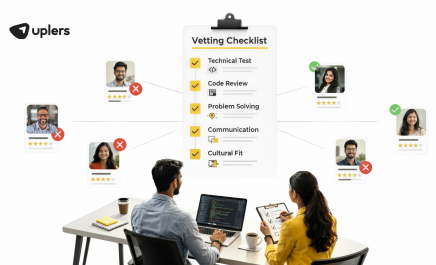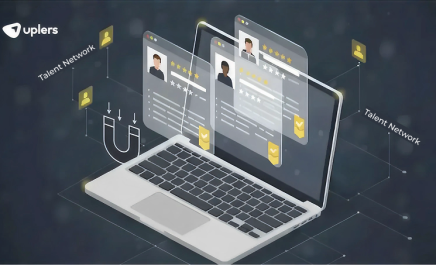Why SaaS Startups are Investing in Swift Developers for iOS Growth
- Shachi Dixit
- May 26, 2025
- 7 Minute Read

SaaS and mobile-first strategies have come together in recent years and now have a lot of significance. Startups planning to launch new software applications or features in 2025 should consider hiring a Swift developer in 2025 to build high-quality iOS apps.
Traditionally, desktop software usage has been much more significant than mobile use, but these new SaaS startups invest in developing highly functional mobile experiences.
Startups and businesses adopt SaaS and mobile-first strategies, driving demand for skilled Swift developers in 2025.
With Swift being the standard for modern iOS development, companies need top talent to build high-quality mobile apps, driving business success and meeting user demands for seamless experiences.
The Rise of Mobile-First SaaS Strategies
Over the years, mobility has surpassed desktop usage in a lot of industries, which has fundamentally changed the way software is being developed. Thus, businesses have now gone mobile-first to meet the users’ demand for a seamless and high-performance experience on a mobile device.
Benefits of Mobile-First Approach
SaaS startups can indeed do the following by adopting a mobile-first approach:
- Seize Market Share: Have highly intuitive, responsive, and feature-rich native mobile applications.
- Accelerate Growth: Turn to mobile apps for increasing user engagement and retention.
Many SaaS startups have gained great traction with a mobile-first strategy. Discussed below are a few examples.
Success Stories
Here’s a look at a few SaaS companies that have successfully embraced mobile-first strategies and leveraged Swift to deliver standout iOS experiences:
- Trello: Visually projects on the web, offers a mobile app for task management and team collaboration.
- Hootsuite: Manage social media with a platform for scheduling, engaging, and analyzing on the go.
- MyFitnessPal: A mobile app that tracks calorie intake, exercise, and weight loss on a fitness and wellness platform.
- Slack: A communication platform that collaborates over messaging, sharing files, and working together, supporting mobile as well.
- Headspace: A meditation and mindfulness solution with features to offer guided sessions and track progress through the mobile app.
The case studies confirm that mobile-first strategies have the potential to propel SaaS startups and multiply their growth and adoption. By following the mobile-first direction, these firms could connect with more users, thus achieving greater success in the market.
Why iOS is a Priority Platform for SaaS Startups
iOS users tend to have higher spending power, generally being maintained by the iOS users. Research shows that iOS applicants would in general be inclined more compared to Android ones to in-app purchase and subscribe to premium services.
Better Monetization Potential on the App Store
SaaS startups enjoy a good monetization chance on the App Store. The App Store hosts a vast user base and has demonstrated its revenue earning capability on behalf of SaaS businesses, thus presenting a profitable platform for scaling and growing businesses.
The sound structure and payment processing mechanism of the App Store simplify the monetization process for startups to monetize their applications and services.
Stronger Security and Privacy Standards
iOS is famed for delivering robust, top-notch security and privacy standards, which attracts interest in enterprise SaaS platforms. Apple’s strict app review process and robust security features, such as Face ID and Touch ID, create a secure environment for sensitive data and transactions.
The Business Case for Using Swift

iOS is a top choice for SaaS startups because its users typically have higher spending power, stronger engagement, and better retention rates.
- Spending Strength: iOS users have higher buying power and better engagement.
- Monetization Potential: The App Store provides ample monetizing options.
- Enterprise-Friendly: iOS features strong security and privacy options suitable for an enterprise SaaS.
- Apple Support: With regular updates and optimizations, the developers are assured of having access to the latest tools.
- Maintainability and Scalability: Swift-based apps are built to allow for easy maintenance and scalability.
Key Benefits of Hiring Swift Developers
Here’s a snapshot of why hiring skilled remote Swift developers is a strategic move for SaaS startups aiming for iOS dominance:
- Quick Development Cycle: Rapid Prototyping and Fast Development using Swift enable rapid time-to-market and quick iterations and refinements of apps based on user feedback.
- Incorporating iOS Native Features & APIs: Swift seamlessly provides access to iOS native features and APIs to enhance mobile performance by making use of device capabilities for a smooth and responsive user experience.
- Well-Developed UI/UX: Swift allows the UI/UX to be developed according to Apple’s design standards while maintaining intuitive and seamless navigation aided by native animations, transitions, and gestures to strengthen user engagement.
- Technical Debt Reduction: The Swift language simplifies the business environment, thereby reducing technical debt and easing maintenance. This leads to easy code maintenance, fast updates, and less complexity.
How Swift Accelerates SaaS Growth

Here’s a closer look at how Swift plays a pivotal role in helping SaaS startups scale faster, deliver better products, and capture more market share:
Mobile-First User Acquisition
Swift enables the development of blazing-fast, native mobile apps that provide seamless user experiences. By leveraging device-specific features, Swift apps can increase user engagement and retention.
Freemium Models and In-App Purchases
Swift supports freemium models and in-app purchases, which are earning potential for companies. This way, they can monetize their mobile platforms effectively while still offering value to free users.
Data-Driven Personalization
Swift enables businesses to collect and analyze data from their mobile users by connecting it to mobile analytics platforms.
Using the user’s data, businesses can create personalized experiences and thus increase the chances of interactive engagement and revenue generation.
Challenges and Considerations
While focusing on iOS can be a smart move for SaaS startups, it comes with challenges. Hiring a Swift developer in 2025 can be tough in a highly competitive talent market, especially for early-stage companies.
When making a decision, startups must always weigh the advantages of an iOS solution against broader coverage across Android and the web. Critical factors that determine the delivery of a product and, consequently, its growth are the management of costs and timelines.
Here are the key challenges to explore:
- Challenges of Hiring Swift Developers with Experience: Talent scarcity, a higher hiring cost with a longer recruiting time.
- Balance Coverage across Platforms: Developing apps to serve multiple platforms (iOS, Android, and web) can be even more costly and complex.
- Cost- and Timeline-wise Development: With Budget limitations and stringent timelines, the quality would be compromised at the product end.
Considerations
It is only during building mobile-first SaaS applications when it is time to take some mindful considerations over the core platforms to be chosen, taking up the most applicable development mode, and resource management.
- Platforms: Identify the core platforms for building from the ground up.
- Develop Mode: Choose between native application cross-platform or hybrid.
- Resources: Efficient management of development costs, timelines, and talent acquisition.
Future Trends: Swift and SaaS Innovation
Swift’s rapid evolution is expanding its reach across domains.
Key advancements driving adoption include:
Key Developments Fueling Swift Adoption
- SwiftUI: Declarative syntax simplifies UI development, streamlining app creation.
- Concurrency Updates: Efficient concurrent code unlocks performance gains, enhancing app responsiveness.
- Server-Side Development (Vapor Framework): Build robust, scalable server-side applications with Swift.
- AI/ML Integration (Core ML): Seamlessly integrate machine learning models for intelligent features.
- ARKit: Create immersive, augmented reality experiences.
How Swift is Adding Value to SaaS Development
These advancements empower developers to create:
- High-performance, responsive mobile apps
- Scalable and maintainable server-side architectures
- Smarter applications with AI-driven features
- Next-gen user experiences through AR integration
By leveraging Swift’s advancements, developers can drive innovation and growth in the SaaS industry.
Real-World Examples of Swift in Action
Here are some examples of companies using Swift for their mobile applications:
- Mobile Notion Expansion: Notion has made scalable mobile apps for SaaS for an unhindered, fast experience of note-taking in a pocket by letting users view and edit their notes anywhere.
- Mobile Slack: Slack built its app in Swift to ensure lightning-fast performance and seamless collaboration. By using Swift, Slack delivers a smooth, efficient experience that enhances team productivity and makes collaboration effortless across all levels of an organization.
- Launching MVPs for Startups: Startups can quickly move, launch, and iterate minimum viable products (MVPs) using Swift and thus promptly test and validate their ideas in the market, collect data, and make easy-to-understand decisions.
Final Words
Hiring Swift developers represents a strategic advantage for SaaS startups intent on crafting high-performance mobile experiences that translate into user engagement and revenue generation.
Swift provides several advantages as a good programming language for iOS development, such as high performance, long-term maintainability, and scalability.
At Uplers, we help SaaS companies hire top-tier developers from our pool of pre-vetted talent, ensuring you get the right expertise without the hassle of traditional hiring.
Whether you’re building a new iOS app or scaling an existing one, we help you connect with the best developers who can drive innovation, optimize performance, and support your growth journey seamlessly.
Contact our team for more info!
Frequently Asked Questions
Why is Swift preferred over other programming languages for iOS development?
Ans: Performance considerations, long-term maintainability, security, speed of development, and app evolution favor Swift over other language choices. With Apple’s constant support and ecosystem enhancement, Swift is indeed attractive.
How does having an iOS app benefit a SaaS startup’s growth strategy?
Ans: Providing an extensively solid mobile experience through an iOS app boosts user engagement and revenue growth to consolidate the SaaS start-up’s growth strategy.
Is Swift suitable for both startup and enterprise-level SaaS applications?
Ans: Yes, Swift is suitable for both startup and enterprise-level SaaS applications that are scaled up in the future, as it is fast and efficient and would need less maintenance in the future.
What are the risks of outsourcing Swift development?
Ans: Some of the risks can include the loss of control over issues relating to security threats, the development process, and maintenance and scalability.
How does Swift improve app performance compared to hybrid frameworks?
Ans: Nonetheless, Swift is innovative in that it is capable of accessing and leveraging the native iOS features and APIs for a faster and more enjoyable user experience.
What’s the average salary or cost of hiring a Swift developer?
Ans: The wages of a Swift developer and other remunerations will obviously differ according to location and work experience; hence, the cost is in the range from $80,000 to $150,000.
Do all SaaS startups need a native iOS app?
Ans: Not every SaaS start-up must have a native iOS app; however, having one can positively affect the users, generating a more competitive edge against other apps with revenue growth in mind.
How do I ensure my Swift-based SaaS app stays scalable?
Ans: Make sure to set up solid architecture coupled with modular design patterns used with added cloud computing power to keep your SaaS running and Swift together.
What tools and frameworks should Swift developers use for SaaS apps?
Ans: Swift developers should use various tools and frameworks to build high-quality SaaS apps. The main ones are Xcode, SwiftUI, and UIKit.







